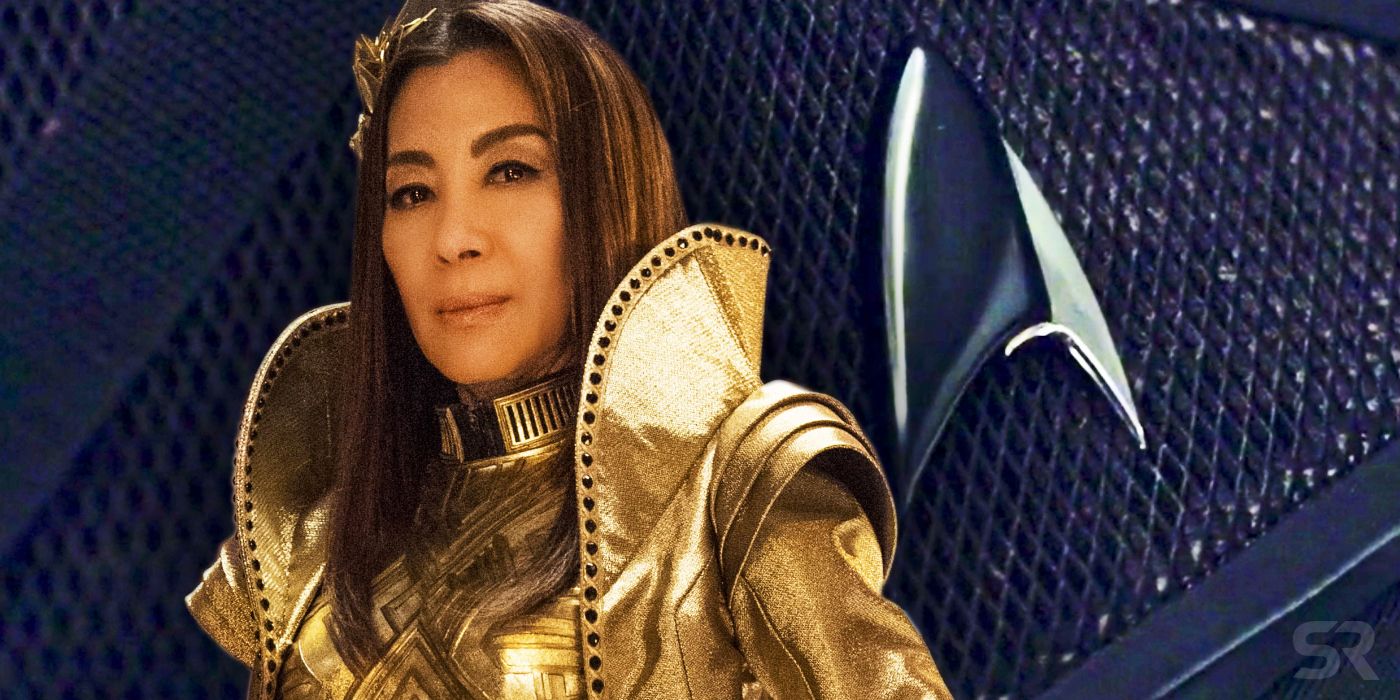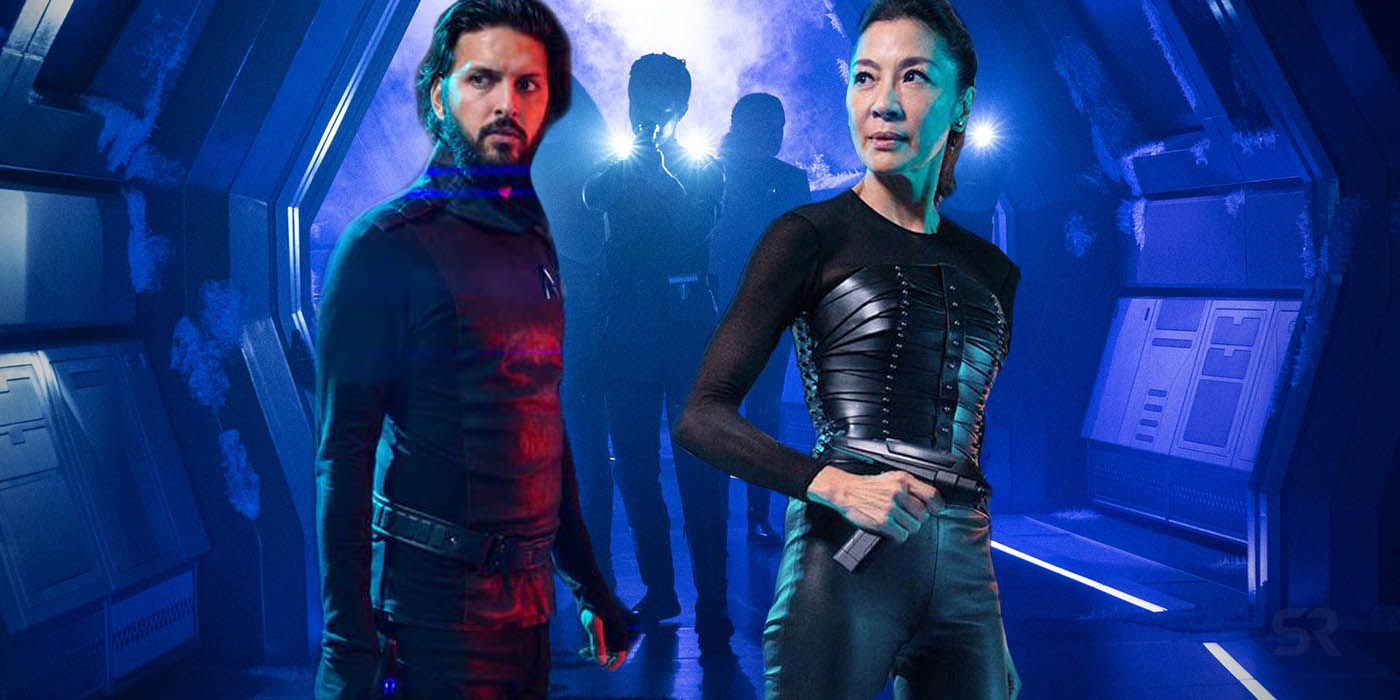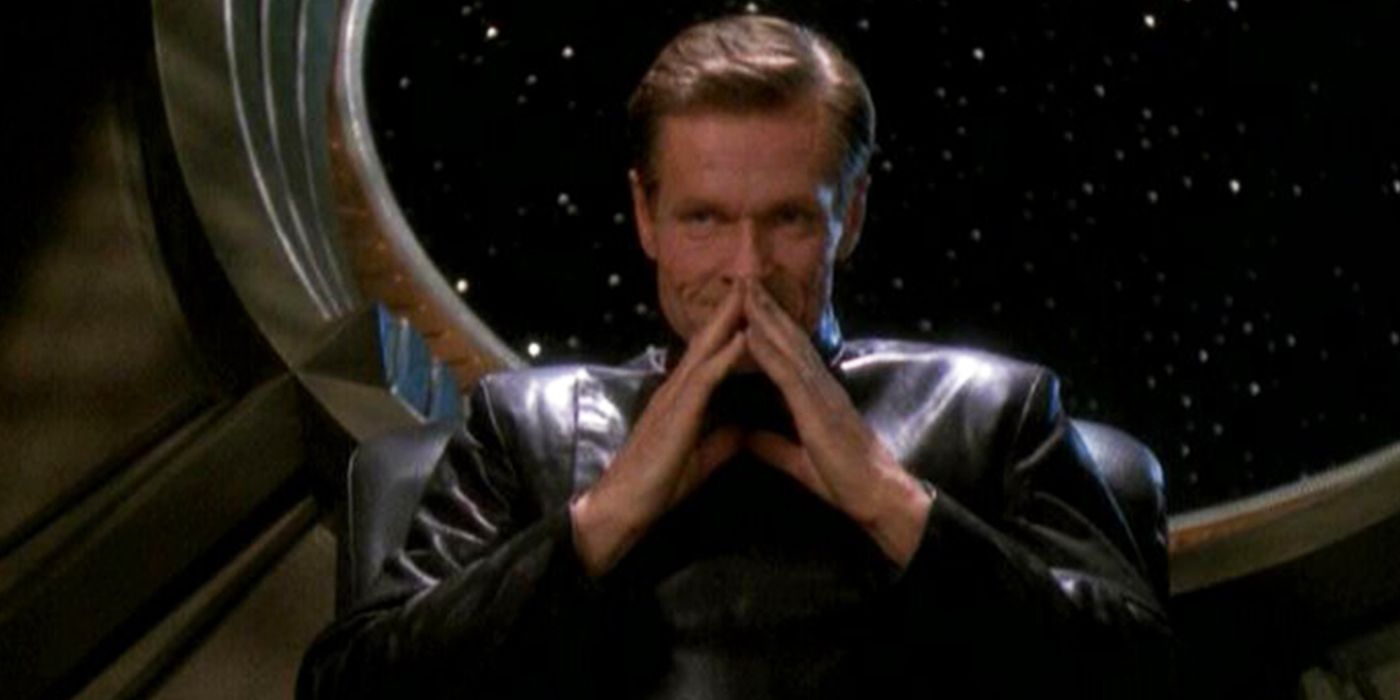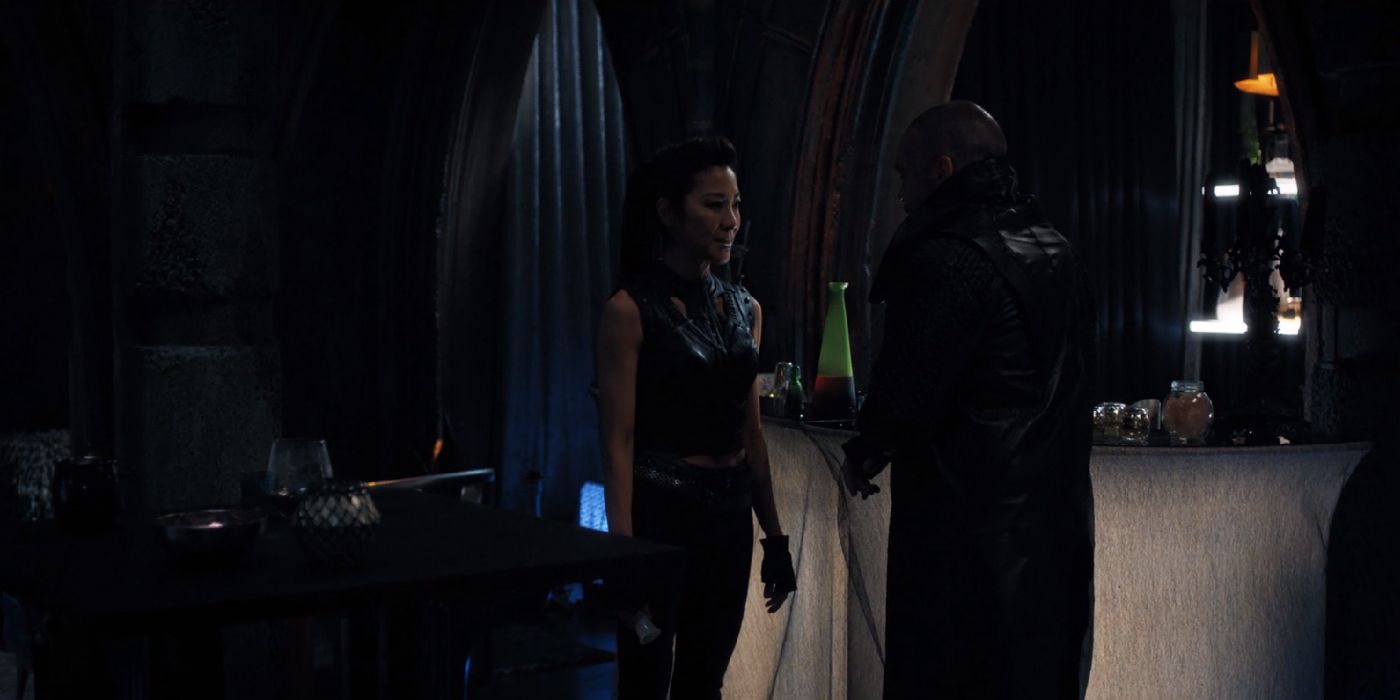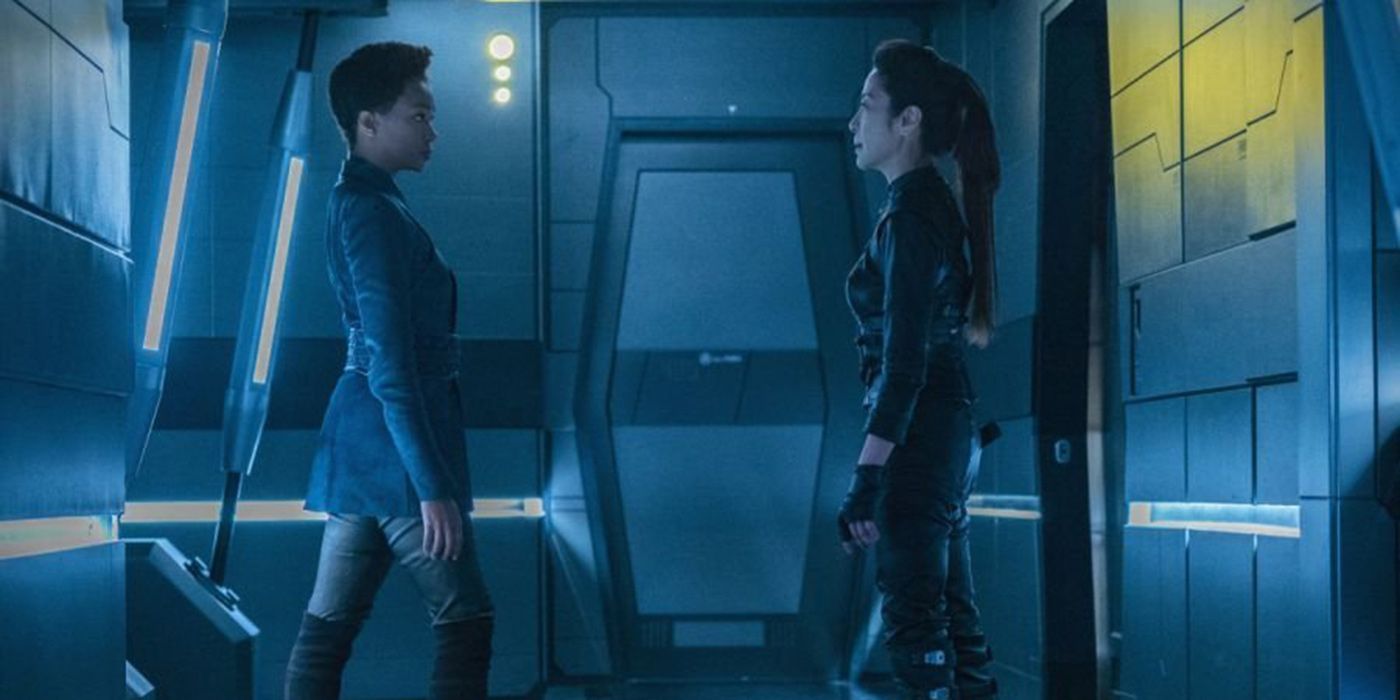The open-secret nature of Section 31 on Star Trek: Discovery drastically contradicts its original characterization as a completely off-the-books agency, but the addition of Philippa Georgiou to their ranks could potentially explain that.
Ira Steven Behr introduced Section 31 on Star Trek: Deep Space Nine as an autonomous, black-ops security organization devoted to protecting the Federation, but often using means that neither Starfleet nor the Federation would ever publicly condone. They remained largely enigmatic throughout their run during the final two seasons of the show, mainly represented by William Sadler as Agent Luther Sloan who repeatedly tried to recruit or outright pressed into service the naïve Dr. Bashir. Bashir’s romantic fascination with James Bond-type holonovels made him the perfect conduit for Behr’s cynical notion that the Federation could not survive in a world beset by enemies like the Romulans and the Cardassians without getting their own hands a little dirty. Perhaps predictably, reactions to Section 31 were mixed given the threatened to augment the foundational principles of Star Trek itself.
Related: Discovery Has Made Section 31 Star Trek's Worst-Kept Secret
Fans argued that the entire point of Star Trek was that it was supposed to depict a humanity that had evolved beyond the kind of corruption Section 31 represented - that the very existence of Section 31 undermined the Gene Roddenberry's optimistic belief that the Federation’s could not only survive but rise to power living by a set of largely uncompromising humanist values. Sure, it might not have been realistic, but wasn't that whole point? Regardless of whatever critical objections emerged, other Star Trek series employed the conceit as they saw fit and evolved the organization as they went, but the agency remained a shadow operation, never coming too far into the light to give the impression it carried enough influence over Starfleet/Federation policy to define the existence of either.
However, Star Trek: Discovery's characterization of the agency threatens to blow that balance out of the water and that has both Star Trek purists and Section 31 fans up in arms. That said, there's an unexpected savior on the horizon whose involvement could appease both sides and she is none other than Philippa Georgiou, Former Emperor.
- This Page: The Problem With Section 31 On Star Trek: Discovery So Far
- Page 2: How Star Trek: Discovery Can Fix Section 31 With Georgiou
Star Trek: Discovery Has A Section 31 Problem
When Section 31 appeared on Deep Space Nine and later on Enterprise, it was a covert, black-ops organization so underground that its very existence was on a need-to-know basis. Captains Sisko and Archer are completely unaware of the agency until their crew members are basically extorted or coerced into Section 31’s service. Even then, Starfleet Command neither confirms nor denies their affiliation. Star Trek: Discovery is a very different story.
As early as episode 3, crew members are seen wearing the organization’s black insignias on Discovery in plain sight, and by season 2, Section 31 is a known entity to virtually anyone who’s paying attention. Ash Tyler walks the ship as a known Section 31 attaché, which not only implies the organization is more like the CIA than Alias’ SD6, but also implies that Starfleet openly sanctions their actions. It’s one thing to accept Section 31 as a necessary evil the Federation occasionally partnered with, but Discovery’s treating what is an autonomous security organization with no checks and balances to guard against the potential for limitless corruption as a part of the Federation’s infrastructure is quite another. Not only it is a drastic and curious departure from canon, it blatantly sullies the nature of the Federation’s guiding principles as an organization in a way that neither DS9 or Enterprise ever did. And it isn’t the first time.
Related: Star Trek Discovery's Section 31 Has An Original Series Klingon Weapon
While Captain Lorca did turn out to be a demonic megalomaniac from another dimension, he still got away with a lot of coloring outside the lines before anyone knew that about him. He tortured the tardigrade for his own benefit, belittled his crew on the regular and generally acted the opposite of any Starfleet captain we’d ever met. Even if he was a wolf in sheep’s clothing, that kind of behavior was a stark change from even the most unlikable Starfleet captains ever before seen on Star Trek. That indicated Discovery was going to push some boundaries with what it meant to be a member of Starfleet and by extension, the Federation. Admiral Cornwell’s later willingness to commit genocide to end the war with the Klingons represented another line we’d never seen anyone in her position approach much less cross. Whichever way you slice it, Discovery’s taken a grayer view of the Federation’s operational ethics than Star Trek ever has before, and their treatment of Section 31 is a manifestation of that. That’s a big change from the way the organization was depicted in Enterprise and Deep Space Nine, and if it goes unanswered it has big implications for the franchise as a whole moving forward.
This isn’t just a design change or the addition of a family member – without being too melodramatic, treating Section 31 the way Discovery does makes the agency less interesting at best and severely dilutes the idealism of Federation’s operational ethics at worst. Simply put, Section 31 and Roddenberry's original vision could peacefully coexist so long as the former remained enough of a secret for audiences to believe its influence wasn't far-reaching enough to taint the latter. Discovery is throwing that arrangement severely out of balance. But DS9 and Enterprise both treated the organization differently in their own rights, and that’s what allows for a way to “repair” this departure from canon if Discovery’s interested in doing so.
Section 31 Was Very Different From Enterprise To Deep Space Nine
In the Star Trek: Enterprise, the earlier Section 31 was just as off the books and autonomous as it was on Deep Space Nine. It followed the canon laid down by Luther Sloan in "Inquisition," when he explained to Bashir that Section 31 predated the Federation itself and was written into the charter when it was formed – specifically Article 14, Section 31. This granted the security organization unlimited agency when it came to dealing with threats to Federation security. That’s far too much power for anyone not to abuse, but, for the most part, the intelligence arm plays pretty nicely on Enterprise (for them).
They help the Klingons kidnap Dr. Phlox when the race desperately needs help fighting the augment virus threatening to wipe them out. They then use their former relationship with Malcolm Reed to slow the Enterprise’s investigation of said kidnapping to allow Phlox the time to finish his work. Their methods aren’t very pleasant, but they know that if the Klingon Empire destabilizes, that had the potential to be very bad for the as yet to form Federation. Similarly, at the end of the series, they provide Reed with information on the terrorist group Terra Prime that sought to obstruct the formation of the Federation. They didn’t give this information to Reed for free, but they did give it. This iteration of the agency engages in unseemly methods, but their intentions feel largely good. The same can’t be said of the Section 31 in the 24th century, the oldest example but most futuristic version of the organization.
Related: Star Trek: Discovery is Making the Unaired Pilot More Important
Section 31 on Deep Space Nine is an agency fully corrupted by its power. Their greatest hits include attempted coercion and successful manipulation of Julian Bashir, framing a Romulan Senator for an assassination that was never going to happen so they could plant one of their own agents in the Romulan government and the attempted genocide of the Founders by the introduction of the morphogenic virus into the Great Link – via Odo (it's worth noting they infected Odo three years before the events of the seventh season in a preemptive strike to ensure a victory against the Dominion should things get to that point). The differences in operational values between the 22nd century and the 24th century are stark, and while that may not have been intentional, it does proffer a possible solution to Star Trek: Discovery’s departure from canon.
Page 2 of 2: How Star Trek: Discovery Can Fix Section 31 With Georgiou
How Georgiou Can Fix Star Trek: Discovery's Section 31 Problem
If there’s one thing to be said about Emperor Georgiou’s time in Section 31 it’s that she won’t be subordinate to anyone for very long. She's successfully undermining Leland at every turn and it’s probably only a matter of time before she supplants him. If that happens, the agency will no doubt be very, very different than it was under Leland or even Harris’ leadership. Georgiou likes power and embraces corruption – she doesn’t really know how to do anything else, so speculating she’d do more of the same working with Section 31 isn’t a huge stretch. And while that might have dire implications for the Federation in the short-term, it could ultimately be good for Star Trek continuity.
It’s not a huge leap to see that the relatively even-handed Section 31 of Enterprise could have been integrated into Starfleet after years of good-faith dealings. But how Section 31 went from the state it’s in in the 23rd century to the state it’s in in the 24th is what requires some explanation. It makes total sense that she could potentially take the organization underground to give herself more freedom to move and less accountability. It also makes sense that she'd engage in such high crimes that the Federation decides to shut down the agency or at least eliminates all official sanction of it. Either way, the influence Georgiou could have on the agency could easily turn it into the organization we see on Deep Space Nine - and, more broadly take what are now disparate interpretations into a seamless evolution.
The only problem with that possibility is the question of why she would stop at Section 31. If Emperor Georgiou starts gaining power, it doesn’t seem likely that anything would stop her from trying to grab more, thus turning Section 31 into a fully antagonistic force. While it has been corrupted in Deep Space Nine, it’s not openly the Federation’s enemy. Her character was a dictator who enslaved or wiped out virtually all opposition to her, and typically those people aren’t comfortable in middle management if there’s an opportunity to move up. For this theory to hold up, Georgiou would have to stay in her lane with Section 31 or be eliminated before she could overreach. Michael Burnham could be the key element to keeping her at least somewhat in line.
Related: Discovery Broke Star Trek Tradition For Its Best TOS Reference Yet
Does Burnham Convince Georgiou To Change?
Georgiou might play up the fact that she deems emotional connection a weakness, but that’s precisely why we think she’s vulnerable to it. She clearly has a soft spot for Burnham, regardless of the warped ways in which it manifests, and that's why we think it’d be possible for Burnham’s influence to eventually temper some of Georgiou's baser instincts. It’s doubtful the emperor would totally change her ways ever, but maybe just enough to make Section 31 as problematic as it is on DS9, but not as openly dastardly as it would’ve been in the Mirror Universe.
If Star Trek: Discovery does address how their interpretation of Section 31 differs from the rest of the continuity and why, Georgiou could be an unintentional, but very lucky lynchpin. And considering her relationship with Burnham continues to be an important element of the show for both women, it’s not out of the realm of possibility that together they could wind up having a serious impact on the organization and bridge the past, present and future canon of the series.

